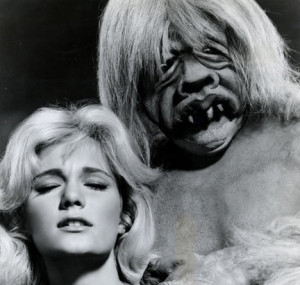Happy Memorial Day weekend!
Having survived the two-day drive from Oakland to Tucson this weekend, I have a renewed appreciation of the power of the audiobook. Okay, so I admit with twin 5-year olds I was listening to children’s books the entire time but nonetheless I had to admire the ‘power of the voice’ to keep us all enthralled during the two most deadly-dull interstates (in my opinion) – I5 and I10. Best of all was hearing Jeremy Irons narrate Roald Dahl’s James and the Giant Peach. He was so good at portraying the dreaded Aunt Sponge and Aunt Spiker that my boys were still talking about it when we had dinner. Despite the 100 degree heat we are so pleased to be here at my folk’s place in Tucson – and, as you will hear about over the next few months, this is the first step in our summer odyssey that will take us through almost all the National Parks in the American West.
I’m pretty beat now…the toll of the heat and the driving, no doubt…but the trip was made delightful by the power of both the story and the voice – boy, am I ever grateful for the invention of the audiobook!
So what’s the best audiobook you’ve ever heard? Any other tips for surviving deadly-dull interstate drives? Because believe me we have some ahead of us I’m sure…though even the most scenic of drives might also be enhanced by a good story. Let me know what you recommend! In the meantime, I’m off for a nice glass of New Zealand Sauvignon Blanc with my hubby…(yes, I am composing this Sunday night not early Monday morning:)!)
Monthly Archives: May 2010
A Word of Caution
John’s post on Friday sparked a healthy combox on the subject of self publishing in this new age. We all know it’s now possible to send an entire novel out to the e-osphere without having to pony up for printing or warehousing. Dreams of making a good sum of money this way, a la Joe Konrath, are dancing in many heads, like visions of sugarplums. Since it isn’t Christmas yet, I feel the need to offer a word of caution.
If you upload your self published novel before it’s ready, you’re more likely to turn off future readers than gain them. If someone plunks down even 99¢ to take a chance on your book, and is disappointed, they are not going to plunk down that money again. If you want to have a career as a novelist, you have to reverse that dynamic. You have to offer books that readers love and leave them wanting more.
Now, this is America. We have free speech and free enterprise. You can put your novel out if you want to. But before you do, I would urge you to consider the following:
It takes a long time to learn how to write narrative fiction. I would guess that 98% of traditionally published authors paid years of dues learning their craft. That same 98% would probably look with horror at their first attempt at a novel. That novel likely sits in a drawer, or on a disk, and will stay there—as it should. Many of these writers have multiple efforts that never saw the light of day.
But let’s say you’ve written and studied and been critique-grouped to the point of psychosis. You have determined you are ready. Hold the iPhone. Before you publish, do the following:
1. Get your manuscript to five “beta” readers. These should be people who are not just going to gush over your work, but people you can trust to give you direct comments on likes and dislikes. Make sure 4 out of 5 give it high marks, and the fifth is pretty close.
Note: this is not your critique group (if you’re in one). Such groups have their own peculiar dynamics. What you want are people who will experience the book as the average reader would. Be prepared to make substantial changes based on the feedback.
2. Hire a freelance editor. It’s well worth it to find somebody who can go over the manuscript, catch glaring errors, and offer fixes. Do your research, though, and make sure you get what you pay for.
3. Pay for a good cover design. Nothing looks cheesier than a typical, self-pubbed, self-designed cover. I recently went browsing at the Kindle store, looking at self-published works. The covers were, by and large, terrible. Unless you have strong graphic and artistic ability, find someone who can design you a great cover.
4. Even after your upload, do not get overconfident. The odds are stacked against you making walk-away-from-your-day-job money this way. If you want to be a real writer, and not just somebody who has made an e-book available, keep growing and working at the craft. Every single day. Then maybe your efforts will start to pay off, down the line.
The modern self-publishing movement, which began with Bill Henderson’s The Publish-it-Yourself Handbook (1973) has just taken a quantum leap forward with e-publishing. But the same caveat that applied then applies now: just because you wrote it doesn’t mean it’s ready.
Be patient. Take some time. And don’t go it completely alone.
Then, if you want to play, you’re free to try your hand at this. As Henderson wrote back in ’73: “Publishing-it-yourself is in the individualistic tradition of the American dream.”
Just do your dreaming with your eyes wide open.
Any other words of advice or warning for those who are itching to jump into self-publishing?
THE WRITER’S LIGHT IS ON
John Ramsey Miller
I’m in a hurry but I’ll tell you what’s on my mind. Tonight I am driving my wife and three-year-old grandson to Panama City, Florida to attend a family wedding. Little Rush is a good rider, but it’s frankly a long, long drive even for adults. I have been driving picturesque county roads counting heads for three weeks, and it’s time for a break. So I get to drive twelve hours, attend a wedding the next day and leave for home a day later alone because I’ve been asked to stay on with the head-counters and move my interviewing and persuading talents to work in a new region driving county roads and counting heads and figuring out ways to get the goods from reluctant individuals. Sometimes I get to become a detective and search out the elusive members of society, who enjoy not participating in the big count.
I have been gathering characters that I want to use in a new book and I’ve been thinking about writing a non-thriller for a change. (I know I’ve said this before) I mean I can’t write a book without a degree of violence because life-or-death situations are the sort of stakes that matter to me. I’m not the sort of author who can write about the coming of age in the deep South without putting in the KKK or a dangerous adversary, but I want to write at a pace that allows for deeper character development––a different pace. I’ve been dancing the Boo-Ga-loo and I’d really like to try my hand at a waltz. I think the Thriller is as important and reaches as lofty a roost as any other genre. If Wally Lamb has anything on Ken Follet I’ll never say its so. Anybody who looks down on our genre has never tried to write one. Thrillers are serious literature and if anybody disagrees we’ll send our characters to wreak havoc on their houses and lay waste to their fields.
In my job I don’t tell anyone that I am a published author, and I think it might have made things different, made me more of an outsider to my co-workers. I thought it might have made my comrades suspicious of me, and guarded in what they said and how they related to me. I’ve been just another worker bee in the cog of the Government wheel and it’s been …well fun and fulfilling in a way I’m not accustomed to.
So after I complete my depression-era gangster novel, I think I will take the time to write that different book. Don’t get me wrong, I love writing thrillers, but like the horse looking at the grass on the other side of the paddock, I’m yearning to make a change. I’m looking to write without a ticking clock, to string together rug tugs, plot bombs, and surprising twists. I had an editor ask me once what the next book was going to be about. I said betrayal. She smiled and said, “Aren’t most thrillers about betrayal?” I guess it’s true. We all hate betrayal and having the protagonist’s danger coming from someone he or she trusts is a standard last twist in most thrillers.
For the past few weeks I have been experiencing life up close. As an observer, and thief of life for so many years, I think I have missed actually living to a great extent. I haven’t been getting out and experiencing the trenches, more like observing at a distance and imaging it as I think it might be to those involved in it.
It seems that most authors with day jobs envy authors who write full time. I find myself envying authors who work at something unrelated to writing and write because they have something to say about their lives, and are always meeting people from a different angle than I think I do. I like being anonymous in social situations. When people know you are a writer, they relate to you differently.
I never had a mid-life crisis, but I’m yearning to try new things while holding on to what I have, to participate more in the lives of my children and grandchildren, to stop coldly observing so much, and get down on the floor and play. And I want to play with my writing.
Do any of you think you’re not climbing into life enough?
Such Anger
by John Gilstrap
www.johngilstrap.com
Last week, Michelle Gagnon reported on Joe Konrath’s presumably groundbreaking deal with AmazonEncore. In essence, his next book will be published first as a Kindle-only edition, and then as a traditional book, with Joe pocketing more attractive royalties than are offered by any mainstream publishers. It was presented as a really big deal. Maybe even a game changer.
Earlier this week, Publishers Weekly posted a story on its website that refuted most of the claims made in Konrath’s press release. The tone of the PW piece was snarky at best, and maybe even a little bit mean. Konrath posted a retaliatory blog encouraging his legions of fans to let PW know that the magazine’s reporter got a lot of facts “wrong.” I put “wrong” in quotation marks here because I’ve got no dog in this fight, and I don’t know any of the facts. I’m certainly not in a position to take sides, and deep down inside, I don’t much care.
What I find startling about the whole thing is the level of anger out there focused on the publishing industry. Publishers, you’ll learn, wouldn’t know quality writing if it kissed them on the nose, and agents are evil incarnate, allegedly in cahoots with the evil publishers to make sure that the world’s most talented writers are never allowed to have a voice in print.
It’s like stepping through some twisted version of Alice’s looking glass. The publishing world alleged by some of the most spun-up of these sites and others represent the exact opposite of my own experience. In the publishing world I know, every agent is desperately hungry for the next great voice in authordom, and every publisher is betting the corporate treasury every day on new talent. They might now be doing it millions of dollars at a time as they were in the 1990s, but they’re certainly doing it tens of thousands of dollars at a time. New careers are being launched every day.
According to many of the posters on the screaming websites, the publishing industry as we know it is locked in denial of the fact that they are dinosaurs that refuse to accept that they’re dying. In their death throes, they refuse to admit that the future lies in self-published novels and ebooks.
It’s hard for me to imagine a more foul-smelling steaming crock of bull poop. Alternative publishing will certainly change the business model—who knows, it might derail it completely—but if that happens, it won’t happen because publishers are evil; it will happen because readers change their habits.
Which leaves us with the anger. Where is this coming from? Isn’t it remotely possible that the preponderance of the rejected manuscripts out there are in fact rejected because they aren’t very good? Or if they’re good, they’re not marketable? Doesn’t the traditional publishing model exist at least in large part because the model provides quality control?
Is it possible that Joe Konrath’s success—which I do not dispute—actually provides false hope to authors who aren’t very good at what they do? As an author who has had at least some measure of commercial success, is it possible that Joe’s success at independent publishing is not relevant to the average aspiring writer?
Series Finales: the Good, the Bad, and the Ugly
Let’s talk about endings today. I’ve been in a bit of a fugue state since LOST concluded on Sunday night. Endings tend to be bittersweet, and this one got me mulling over the final episodes of some of my other all-time favorite shows. Fans of LOST, THE SHIELD, THE WIRE, LAW & ORDER, SEINFELD, THE SOPRANOS, and SIX FEET UNDER, here’s your warning: if you haven’t seen the final episode of these series yet, there are spoilers ahead…
I became hooked on LOST early on. Over the past six seasons it was sometimes fantastic, occasionally maddening, and always puzzling. At the moment, how to draw something to a close is a particularly relevant subject for me, since I recently finished the fourth book in my series. All of those books have primarily focused on the arc of two characters, and with this final book, that arc needed to draw to a close. Mind you, I’m not done with the series, but the focal point will shift with the next book. Because of that, I really wanted to wrap things up in a way that was ultimately satisfying (although not necessarily “happy”). It’s a challenge that most series face. Some rise to the occasion, others fall flat.
So here’s my rundown of the best and worst television series finales. Feel free to chime in on what you thought of each:
- LOST: To be honest, I didn’t have high expectations for this finale. I knew going in that there were so many dangling threads, there was simply no way the writers would be able to tie them all up. Yet I was pleasantly surprised. What I think they gave us, in the end, was viscerally satisfying. The characters that we’ve grown to care about all completed their journey, there were some nice tie-ins to incidents going all the way back to the pilot. That initial episode concluded with Jack saying, “If we can’t live together, we’ll die alone.” As it turned out, living together meant that when they did die, they weren’t alone. The finale didn’t answer every lingering question (what was the island after all? Just a giant MacGuffin?) but it managed to deliver what the show has alway
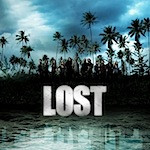 s provided in its best moments. Since the debut it was an emotional ride, focused on the characters and the journey they’ve undertaken together. It provided enough answers to give some satisfaction, while still leaving quite a bit open to debate. I suspect that if the writers had known from the outset how many episodes total they’d have to play with, it would have been a much tighter story arc. But alas, that’s not how the world of TV works. Going in, they never could have guessed what a hit the show would become, and how many slavering fans would dissect every scene. That being said, I think they did a great job. In the end the series shone a light on the true meaning of love and friendship, redemption, and mortality. Some people complained that it was mawkish and maudlin. For me, the sentimentality worked. After all, I’d spent years with these characters. I cared about what happened to them. I wanted things to work out for them- and based on my interpretation of the finale, it did.
s provided in its best moments. Since the debut it was an emotional ride, focused on the characters and the journey they’ve undertaken together. It provided enough answers to give some satisfaction, while still leaving quite a bit open to debate. I suspect that if the writers had known from the outset how many episodes total they’d have to play with, it would have been a much tighter story arc. But alas, that’s not how the world of TV works. Going in, they never could have guessed what a hit the show would become, and how many slavering fans would dissect every scene. That being said, I think they did a great job. In the end the series shone a light on the true meaning of love and friendship, redemption, and mortality. Some people complained that it was mawkish and maudlin. For me, the sentimentality worked. After all, I’d spent years with these characters. I cared about what happened to them. I wanted things to work out for them- and based on my interpretation of the finale, it did. - THE WIRE: Still, hands down, the best show ever produced for television. And the conclusion delivered. As always with this show, things weren’t tied up with a neat bow, because real life isn’t like that. But we saw the torch being passed to a younger generation, for better and for worse. We saw redemption for McNulty, justice for Daniels, and Bubs getting a new lease on life. This was probably my favorite series finale ever. Well done across the board.
- THE SHIELD: Tough one here. I loved the show from the outset for the moral gray area that all of the characters occupied. Like the WIRE, it felt more real than the vast majority of police dramas. It was never as simple as the good guys vs. the bad guys,
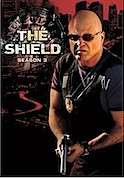 because every character possessed the capacity for both good and evil acts (even Dutch: remember him strangling that cat?) And the conclusion here was grim. In the end, Vic Mackey ended up losing his family and friends, stuck in a day job that was for him a living hell, with all of his crimes brought to light. Things didn’t really end well for most of the characters we cared about: they were either dead, in jail, or alone and isolated. It was the furthest thing from a happy ending, yet it was satisfying, because there was a sense that justice had been done, and everyone ended up paying the price for it.
because every character possessed the capacity for both good and evil acts (even Dutch: remember him strangling that cat?) And the conclusion here was grim. In the end, Vic Mackey ended up losing his family and friends, stuck in a day job that was for him a living hell, with all of his crimes brought to light. Things didn’t really end well for most of the characters we cared about: they were either dead, in jail, or alone and isolated. It was the furthest thing from a happy ending, yet it was satisfying, because there was a sense that justice had been done, and everyone ended up paying the price for it. - SIX FEET UNDER: This finale if right up there for me. The final few minutes in particular, when Claire was driving away from her family to start a new life, interspersed with flash forwards that tied in so nicely to the opening of every episode, were sheer genius. Viewers witnessed the death of every major character in a sort of time-lapse montage video: some demises were funny, others tragic or mundane. Thanks to those snapshots of their future lives, it was probably the most satisfying series ending I’ve ever seen.
- LAW & ORDER: I just watched this last night. I’m not sure if the writers were aware that this particular episode would mark the end of the second longest-running drama on television. Either way, I like that they didn’t over do it. Most of the episode was just like any other installment, although this time (interestingly enough) there was no actual homicide (and if you’re going to get picky, no real reason for Lupo and Bernard to be investigating a potential terrorist threat. But I digress). The final scene with the lieutenant was heartwarming, although the great strength of the show was that viewers were left largely unaware of the personal lives of the characters. You were treated to tantalizing tidbits here and there, but the focus always remained firmly on their work lives (this is why they were able to keep going for twenty years despite a slew of cast changes, in my opinion).
Now, on to some finales that disappointed.
- I realize that this is probably going to spark some debate, but I was one of the people who really loathed THE SOPRANOS finale. There were many far more interesting things they could have done, as opposed to that surreal, disjointed final scene in the diner (Speaking of which, if you missed the LOST alternate endings o
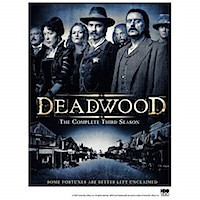 n Jimmy Kimmel, see them here. Brilliant). The writers could have gone back to the pilot, bringing back those damn ducks. They could have had that Russian finally wander back out of the woods (speaking of threads that were never tied up). While I appreciated that they ended with the family, which is largely what the show was about, I still felt let down.
n Jimmy Kimmel, see them here. Brilliant). The writers could have gone back to the pilot, bringing back those damn ducks. They could have had that Russian finally wander back out of the woods (speaking of threads that were never tied up). While I appreciated that they ended with the family, which is largely what the show was about, I still felt let down.
- SEINFELD: Terrible. Just awful. Having the characters end up in jail was absurd, and not in the trademark manner of the rest of the show. It felt forced, nasty, and just plain silly. Worse yet, there was nothing funny about it- which is downright criminal for the conclusion of one of the all-time funniest sitcoms. I have never been more disappointed by the end of a series.
- DEADWOOD: This show ended prematurely, and on a flat note thanks to some serious missteps by HBO. It’s a shame that they’ll probably never be able to get everyone together again for that hinted-at film that was supposed to make up for it. What started with a roar ended with a whimper.
So I’d love to hear what you think of these, and other shows I might have missed. Who did it well? Which finales bombed?
Is #2 more important than #1?
By Joe Moore
 Here’s a question that popped up recently on a writer’s forum: has being published made it easier for agents and editors to accept your future work? Are they more lenient because you’ve already been published or do they give your writing the same level of scrutiny that unpublished submissions?
Here’s a question that popped up recently on a writer’s forum: has being published made it easier for agents and editors to accept your future work? Are they more lenient because you’ve already been published or do they give your writing the same level of scrutiny that unpublished submissions?
There are many factors here that can affect the publication of a second or third book. Obviously, the success of book one will certainly help getting a contract on the next one. But just because you had the first one published is no guarantee contracts will be issued on follow-ups.
I think that being published through traditional, legitimate methods means that you’re writing on a professional level. And people who write at a professional level usually have an easier time at getting published. Publishing credits do help in getting read, but there’s no substitute for a great book.
I also believe that the most important book you’ll ever write is your second one. Number 2 is THE book. It’s far more important than the first or the third, perhaps the most important of your career. Many folks can write one book, but the number declines when it comes to that second novel. It’s the one that can make, damage or even destroy a future in fiction.
What do you think? Did you feel it was easier to get that second book published after the first hit the shelves? Do you think #2 is critical?
Don’t forget to download a copy of FRESH KILLS, Tales from the Kill Zone to your Kindle or PC today.
Open Tuesdays
 As we announced last week, while our blogmate, Kathryn Lilley, is on medical hiatus, we’re opening up the Kill Zone on Tuesdays for general questions, comments and discussions. If you have a question about writing, publishing or taking the 2010 Census in rural areas, ask away in our comments section. We’ll do our best to get you an answer.
As we announced last week, while our blogmate, Kathryn Lilley, is on medical hiatus, we’re opening up the Kill Zone on Tuesdays for general questions, comments and discussions. If you have a question about writing, publishing or taking the 2010 Census in rural areas, ask away in our comments section. We’ll do our best to get you an answer.
And don’t forget you can download a copy of FRESH KILLS, Tales from the Kill Zone to your Kindle or PC today.
Hiring your own Publicist
- First, make sure you know exactly what your publisher is proposing to do in terms of in-house sponsored publicity. Are they sending you on a book tour? If so, where? Where are they sending your ARCs? What media, if any, are they arranging?…These are all critical questions that you need to have answered before you consider hiring your own publicist. In my experience, it can be difficult to get the level of details you want from your publisher so you might have to probe and push to get the information you need. I was given a publicity/marketing plan so I did have an overall sense of what my publisher was and was not going to do (though my publisher was still reticient about giving me specific details regarding media/other event contacts made). For The Serpent and The Scorpion, I was fortunate my publisher sent me on a book tour and that my in-house publicist was willing to work with my independent publicist on media opportunities and events in parallel to what she was organizing.
- Outline your own publicity plan, identifying what you can do on your own – this will help you identify publicity needs that an independent publicist can fill. There are many things you can do on your own – it’s just a question of time and identifying the appropriate contacts – but you need to ask yourself how much time you are willing to devote to setting up media events etc. and whether you feel comfortable doing this on your own.
- Next, you need to seriously consider what opportunities exist that an independent publicist can assist you with. Fiction can be a hard sell publicity- wise, so you need to consider what angle(s) a publicist may be able to take advantage of – and you need to be realistic in terms of your expectations. Just because you hired an independent publicist does not mean you’ll be appearing on Oprah…
- You need to also consider what you are willing to do – and what strengths/weaknesses you have. For instance, are you willing to do radio? Do you enjoy public speaking? Are you an introvert who would simply die if you had to address more than 10 people at an event? It’s important that you play to your strengths and are honest about your own abilities…
- When you have decided that an independent publicist could add value to your publicity campaign, then you need to think long and hard about that dreaded word – budget. You need to consider what are you willing to pay and what results you expect for the money you plan on plopping down. Remember there are additional things that you will have to pay for as part of the hiring process like a national crime check…which leads to my final point…
- Negotiate so you set expectations up-front and so you know exactly what you’re getting for your money. Many publicists work on retainer and make no promises as to outcomes – this can be frustrating if you find yourself doling out the money and getting little in return. Other publicists work on a ‘per-gig’ basis so you only pay for the radio interviews/TV appearances/reviews/events they actually set up. In my opinion, the latter is the better way to go but you must still be up-front in terms of your expectations. There’s no point you envisaging an appearance on the ‘Today’ show when your publicist can only get you a community cable TV spot…that’s just a recipe for disaster!
The Future of Reading…and Everything Else
The man who does not read good books has no advantage over the man who can’t. – Mark Twain
Twain’s words remind me of one of the formative movies of my youth, The Time Machine. In this version of the H. G. Wells story, the narrator (Wells himself, played by Rod Taylor) goes far into the future where he discovers the Eloi. They are placid people, living without passion or curiosity–and therefore powerless victims of the Morlocks, who reside underground.
What disgusts Wells is the discovery that the Eloi have given up reading. Their books have crumbled into dust. They have no repository of collective knowledge, except in a museum they don’t frequent.
Thousands of years of building up civilization, gone! So that they can become what they are, virtually mindless beings who spend their days seeking pleasure (only to be enslaved, and eventually eaten, by the Morlocks)
In an essay in the L.A. Times entitled “The Lost Art of Reading,” Times book editor David L. Ulin reflects on the increasing difficulty people are having focusing on, and “inhabiting,” the world of a book:
“Such a state is increasingly elusive in our over-networked culture, in which every rumor and mundanity is blogged and tweeted. Today, it seems it is not contemplation we seek but an odd sort of distraction masquerading as being in the know. Why? Because of the illusion that illumination is based on speed, that it is more important to react than to think, that we live in a culture in which something is attached to every bit of time.”
We know this to be true. With a smartphone and/or an iPad or iTouch, or any other similar item to come down the pike, one never has to face a moment of silence or contemplation again.
So what does this portend for the future of reading? And writing long form narrative fiction? What, in fact, does it portend for the future, period?
I’m asking you. What do you think?
Every Author Wants A Great Review
By John Ramsey Miller
Over my career I have been extremely lucky because I have mostly had positive reviews for my works. The only negative reviews I’ve had were on Amazon left by skunks, idiots, or enemies. What sane person pans one of my books? At least one hopes bad reviews are a result of a conspiracy. Those Amazon reviews you can mostly ignore, especially when you discover the reviewer is a fan of one of your competitors (whom you may have been compared to somewhere), or someone who always reviews your books and gives less than positive reviews, a failed author who hates everything because it’s inferior to their own misunderstood opus. I think that if a reader doesn’t like your first book, why would they keep reading consecutive novels by you and adding negative reviews for each? Perhaps it could be someone you fired or someone whose manuscript you didn’t send to your publishing house with a note demanding it be published forthwith and a massive advance paid. Some of these authors will assume you are jealous of their talents and trying to suppress their greatness. Whatever it may be, the reviews on that place shouldn’t depress or impress.
Of my seven novels, none got a starred review in Publisher’s Weekly. It’s a big deal, as we all know well. A very big deal considering the number of books published and the few slots available. Most reviewers find something to not like as much as they like the rest. Gilstrap, whom you might have figured is a close friend of mine, (although I have never seen him in a Speedo) would never have put this review in his blog, but I can put it in mine because he deserves to have it shared by those who value him and understand what a struggle his career has been and how hard and diligently he has labored at this game we play. Nobody writes or thinks harder than John Gilstrap, and nobody deserves a dollop of praise more.
May I present:
Hostage Zero
John Gilstrap, Pinnacle, $6.99 (448p) ISBN 978-0-7860-2088-1
The addictively readable second thriller featuring freelance hostage rescue operative Jonathan “Digger” Grave (after 2009’s No Mercy) marries a breakneck pace to a complex, multilayered plot. When two teenage boys are inexplicably kidnapped from a Virginia residential school for children of incarcerated parents, Grave and his crew set out to locate the victims and apprehend the abductors. Then one of the boys is drugged and left to die in a field, saved only by the fateful intervention of a passing homeless man, and Grave’s investigation begins to turn up leads that point to government and organized crime connections. A roller-coaster ride of adrenaline-inducing plot twists leads to a riveting and highly satisfying conclusion. Exceptional characterization and an intricate, flawlessly crafted story line make this an absolute must read for thriller fans. (July)
We’ve all had good reviews with a bomb somewhere in the body of the review. I had one review where the woman, who was not a fan of fiction and said so, said the opening chapter of my book was like walking into a mens locker room and kicking over a bucket filled to the brim with adjectives. I’ve had one of my books praised as one hell of a read, then described as “Gun” fiction. I thought that was a pretty good plug. Last night I went to a birthday party for a friend and I gave him a box of 9mm tracer ammo I’d had in the closet gathering dust for a few years.
Reviews have been discussed here before and will again. Nothing lights up your day like a review in a place like PUBLISHERS WEEKLY or KIRKUS because those reviewers know books and everybody in the industry and most book buyers read those reviews and often base buys on what they say. We don’t know how many sales are generated by reviews because there’s no real way to measure that. Oprah could (and probably can still) sell millions of copies by mentioning a book. I believe reviews do affect sales, but probably not as much as we think they do. The best sales tool is word of mouth, or BUZZ, which when it comes, usually vanishes just as quickly. Think cigarette smoke in a wind, more than oil spewing from a pipe a mile underwater which nobody can figure out a way to plug. We are depending on the same scientists to save the world and they can’t plug a ten inch pipe.
I also wanted to share a picture of John and I taken at Magna Cum Murder.
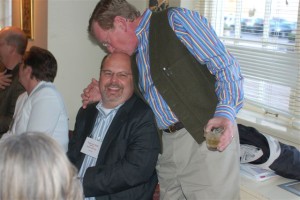
So, how many of you have received less-than-stellar reviews? What was the most distressing or comical lines, if you can remember them? And do you think reviews really affect sales? Have you ever kissed John’s head? Do you know the taste of Turtle Wax?

